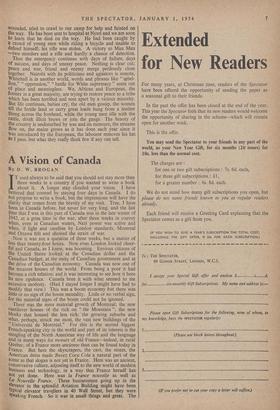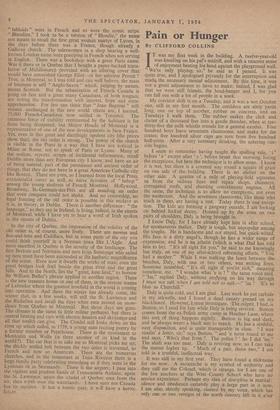A Vision of Canada
IT used always to be said that you should not stay more than three weeks in a country if you wanted to write a book about it. A longer stay clouded your vision. I have bettered that counsel by staying four days in Canada. I do tot propose to write a book, but the impressions will have the Now it was not a question of three weeks, but a matter of less than twenty-four hours. Now even London looked cheer- ful and Canada, as I knew, was booming. Envious citizens of the United States looked at the Canadian dollar and the Canadian budget, at the unity of Canadian government and at the drive of the Canadian economy. Canada was now one of the treasure houses of the world. From being a poor it had become a rich relation, and it was interesting to see how it bore its new opulence. Canada bore it with what seemed to me excessive modesty. (Had I stayed longer I might have had to niodify that view.) This was a boom economy but there was little or no sign of the boom mentality. Little or no verbal sign, for the material signs of the boom could not be ignored. " tabloids " were in French and so were the comic strips. " Blandine," I took to be a version of " Blondie," the name not meant to recall the first great woman martyr of Lyons, in the days before there was a France, though already a Galilean church. The saleswomen in a shop bearing .a well- known London name were gossiping in French when not serving in English. There was a bookshop with a great Paris name. Was it there or in Quebec that I bought a paper-backed trans- lation of Middlemarch provided with an alluring cover that would have astonished George Eliot—or her admirer Proust ? True, in Montreal, so I was told and can well believe, the mass of business is still " Anglo-Saxon " which, judging by names, means Scottish. But the urbanisation of French Canada is going on fast and a great many Canadians, of both tongues, are noting the 'transformation with interest, hope and some apprehension. For few can think that " Jean Baptiste " will remain unchanged in this new world (there arc, I learned, 75,000 French-Canadians now settled in Toronto). The immense force of stability represented by the habitant is far from being dissipated, but Mayor Houde of Montreal is a representative of one of the new developments in New France. Yet, even in this great and dazzlingly opulent city (the prices show that), the old order is strong. The power of the church is visible in the Press in a way that I have not noticed in Milan or Rome, not to speak of Paris or Lyons. Many of the notices, reports, scraps of incidental information, recall Dublin more than any European city I know, and have an air of being natural, part of the permanent and ancient order of things, that they do not have in a great American Catholic city like Boston. There are even, so I learned from the local Press, existentialist caves as well as naive devotees of " bebop " among the young students of French Montreal. Hollywood, Broadway, St.-Germain-des Pres are all assailing an order that even conquest could not shake. And no censorship, no legal freezing of the old order is possible in this enclave as it is, in theory, in Dublin. There is another difference : " the language," as they say in Ireland, is living, indeed, in the streets of Montreal, while I have yet to hear a word of Irish spoken in the streets of Dublin.
In the city of Quebec, the impression of the solidity of the old order is, of course, more lively. There are movies and five-and-tens and Cadillacs, but in some parts of the city you could think yourself in a Norman town like L'Aigle. And most manifest in Quebec is the novelty of the landscape. The first Bretons and Normans and men from Saintonge who sailed up here must have been astounded at the barbaric magnificence of the scene. Even now it dwarfs the works of man; even the great bridges look frail beside the great river and the great hills. And to the North, lies the " great, lone land," to borrow Sir William Butler's phrase applied to another region. There is the new treasure house or one of them, in the remote wastes of Labrador where the greatest ironfield in the world is coming into operation. And there the winter has already come, the winter that, in a few weeks, will still the St. Lawrence and the Richelieu and recall the days when men moved on snow- shoes from Quebec to Montreal. But those days are gone. The climate is the same (a little milder perhaps), but there is central heating and cars with electric heaters and ski-jumps and all that wealth can give. The Citadel still looks down on the river up which sailed, in 1759, a young man reciting poetry by a former member of Peterhouse. There is the monument to Montcalm and Wolfe (is there another of its kind in the world?). The car that is to take me to Montreal picks me up; the thickly settled belt between the two cities is traversed, so French and now so American. There are the numerous churches. and in the restaurant at Trois Rivieres there is a large family party celebrating something as if they were in the Lyonnais or in Normandy. There is the airport; I pass into the vigilant and prudent hands of Transcanada Airlines; again the St. Lawrence, again the citadel of Quebec seep from the air; then Wirth over the wastelands. I have seen not Canada but its nuc:eus. It has a heroic past; it w;11 have a heroic future,











































 Previous page
Previous page